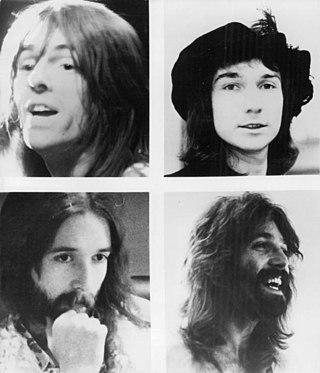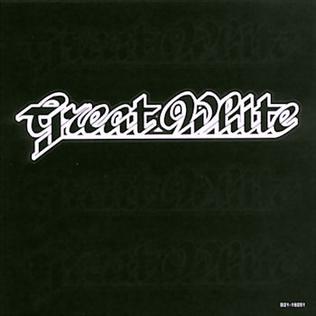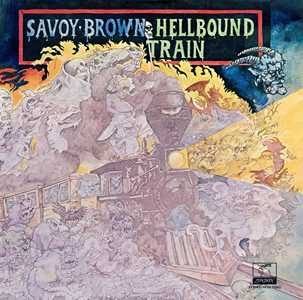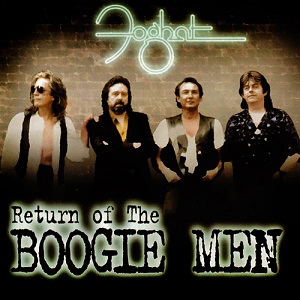
David Walker is an English singer and guitarist who has been front-man for a number of bands; most notably The Idle Race, Savoy Brown and Humble Pie, he also served briefly with Fleetwood Mac and Black Sabbath.

Foghat are an English rock band formed in London in 1971. The band is known for the use of electric slide guitar in its music. Their best known song is the 1975 hit "Slow Ride". The band has released eight gold albums, one platinum and one double platinum album, and despite several line-up changes, continue to record and perform.

Savoy Brown were a British blues rock band formed in Battersea, southwest London, in 1965. Part of the late 1960s blues rock movement, Savoy Brown primarily achieved success in the United States, where they promoted their albums with non-stop touring. Founder, guitarist and primary songwriter Kim Simmonds was the sole constant member of the band from its formation in 1965 until his death in 2022.

Kim Maiden Simmonds was a Welsh musician. He was the founder, guitarist, primary songwriter and sole consistent member of the blues rock band Savoy Brown, which he formed in 1965. Simmonds had led Savoy Brown since its inception, appearing on every Savoy Brown release.

The Best of Mose Allison is a compilation album by Mose Allison. It includes some of the jazz pianist and singer's best-known recordings for Atlantic Records. The album was originally released in 1970 as an LP record with 12 songs. The album was re-issued on a CD in 1988 with an additional eight songs and new sequencing.

Foghat is the debut studio album by American-based English rock band Foghat. The first of their two self-titled albums, it was released in 1972 on Bearsville Records.

Great White is the first full-length album by the American rock band Great White. Three tracks are taken from the band's previous EP, albeit in re-recorded versions. The musical style of this album is very different from the following highly successful releases of Great White, as they display here a more hard-driving metal sound as opposed to their later, blues-infused rock sound. EMI America judged the album a disaster and Great White was dropped. This led to a rethink by the band, and they became less heavy, introducing a tame hard rock sound for later albums.

Raw Sienna is the fifth album by the band Savoy Brown. It was recorded and released by Decca in the United Kingdom in 1970 in both mono and stereo. For release in United States and Canada, masters were leased to Parrot Records —PAS 71036.

David Jack Peverett, also known as Lonesome Dave, was an English singer and guitarist, best known as the original lead vocalist and rhythm guitarist of the rock band Foghat, which he co-founded following his tenure in Savoy Brown.

A Step Further is the fourth album by the band Savoy Brown. It was released by Decca in the United Kingdom and by Parrot in the United States in the fall of 1969. It is the last of the band's albums on which their long-time pianist Bob Hall played. The album track "Made Up My Mind" had first appeared as the B-side of the U.S. single release on Parrot Records 45-40039, fronted by "Train to Nowhere", from their album Blue Matter. The track "Waiting in the Bamboo Grove" would later be released as the B-side of the U.K. single release on Decca F 13019, of "A Hard Way To Go" from their album Raw Sienna.

Looking In is the sixth album by the British blues band Savoy Brown. The album featured "Lonesome" Dave Peverett on vocals, after Chris Youlden left the band the previous spring. Leader/guitarist Kim Simmonds would be the only band member to continue with the band after this album, as all other band members left to form Foghat the following year.

Hellbound Train is the eighth album by the band Savoy Brown.

Blue Matter is the third album by the band Savoy Brown. Teaming up once again with producer Mike Vernon, it finds them experimenting even more within the blues framework. Several tracks feature piano as well as trombone.

Street Corner Talking is the seventh studio album by the English blues rock band Savoy Brown. Released by Parrot Records in 1971, it was the first album released after the departure of guitarist Lonesome Dave, drummer Roger Earl, and bassist Tone Stevens, who all went on to form the more successful rock band Foghat. This left Kim Simmonds as the only remaining member. Simmonds recruited a new line-up of members, predominantly members of the previous line-up of the blues band Chicken Shack, which had undergone a seismic change in membership similar to that which had affected Savoy Brown, which, in turn, ushered in a new sound for the band.

Shake Down is the debut studio album by the British blues rock band Savoy Brown. It was released in 1967 under the name of Savoy Brown Blues Band and is mainly an album of covers, featuring three songs penned by blues singer Willie Dixon. In addition to Dixon, the band covers John Lee Hooker and B.B. King. The album was not originally issued in the US, but was available as an import, until released on CD in 1990.

Nowhere Road is the first solo album by ex-Savoy Brown vocalist Chris Youlden, released in 1973. The album featured a number of well-known session musicians including Chris Spedding, Ray Fenwick, Roy Babbington and ex-Fleetwood Mac guitarist Danny Kirwan.

Return of the Boogie Men is the thirteenth studio album by British hard rock band Foghat, released in 1994. This album reunited the original members of the band, Dave Peverett, Roger Earl, Rod Price and Tony Stevens. Price had left the group after the completion of 1980's "Tight Shoes" release; Stevens had departed following the recording of "Rock and Roll Outlaws" in 1974. Beginning in June, 1994, Foghat toured through the end of 1996 to promote "Return of the Boogie Men". Two performances at the Roseland Theater in Portland, Oregon on October 25 and 26, 1996 were recorded which resulted in the 1998 live album, Road Cases.
Rivers Jobe, born Rivers Maitland Alexander Job, was a British bass player known for being a member of Anon, one of the two bands which merged to form the progressive rock band Genesis; and for playing on the Savoy Brown album, Getting to the Point (1968), as well as on the tracks "Vicksburg Blues", "Train to Nowhere", and "Tolling Bells" on the following Blue Matter album. Jobe was replaced in Savoy Brown by Tone Stevens in November 1968, and performed as a session musician and busker until his death.

Decades live is the second live album by Foghat, released in 2003. It is the first live album by the band since 1977's Foghat Live. It contains live recordings of the band, featuring different lineups, from between 1977 and 1996.


















